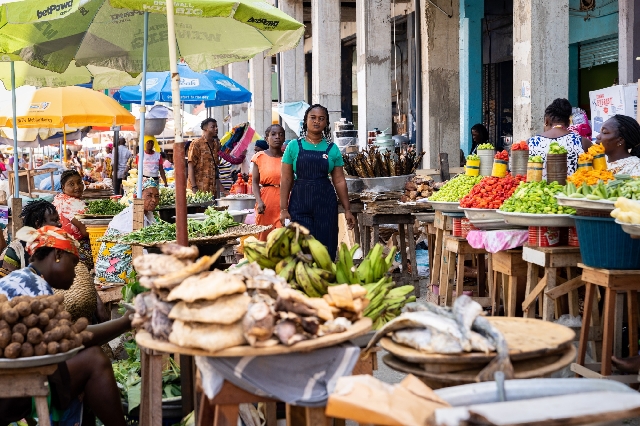Ghana’s economy expands by 6.3% in second quarter of 2025
 Market scene
Market scene
Ghana’s economy grew by 6.3% in the second quarter of 2025, that’s according to data released by the Ghana Statistical Service in Accra today, September 10, 2025
Non-oil GDP rose by 7.8 percent, supported by gains in agriculture and other productive sectors, demonstrating the economy’s reduced dependence on petroleum revenues. The diversification proved crucial as oil production continued to face headwinds throughout the first half of 2025.
The year began with agriculture leading economic expansion, driven by improved cocoa production and stronger fishing yields. The agriculture sector recorded 6.6 percent growth in the first quarter, primarily due to a 6.7 percent increase in the crops sub-sector, surprising analysts who had expected slower recovery.
However, the economic narrative shifted dramatically in the second quarter as services took command. Key contributors to this expansion included finance, insurance, trade, and education sectors, which demonstrated resilience and dynamism. Information and communication services experienced particularly strong growth, reflecting Ghana’s ongoing digital transformation.
The services boom coincided with agricultural moderation as farming and fishing activities showed signs of seasonal adjustment. Industry contributed 33.2 percent to GDP but recorded more modest growth of 2.3 percent, while agriculture accounted for 24.8 percent of the economy with 5.2 percent expansion during the second quarter.
Ghana’s economic performance comes as the country emerges from its deepest economic crisis in a generation. Finance Minister Cassiel Ato Forson said in March that spending cuts should allow Ghana to achieve real GDP growth of at least 4 percent by the end of 2025, suggesting the current trajectory exceeds official expectations.
The growth acceleration reflects improved macroeconomic stability following successful negotiations with international creditors and implementation of fiscal consolidation measures. Inflation pressures, which peaked at over 50 percent in 2022, have moderated significantly, providing more favorable conditions for business investment and consumer spending.
The non-oil sector has demonstrated particular strength, with quarterly expansions providing evidence of economic diversification away from traditional commodity dependence. This diversification strategy has become increasingly important as global oil markets face volatility and Ghana seeks to build more sustainable growth foundations.
The strong services performance particularly benefits urban centers like Accra and Kumasi, where financial services, telecommunications, and digital platforms have experienced rapid expansion. Mobile money transactions, fintech adoption, and e-commerce growth have contributed significantly to the information and communication sector’s robust performance.
Agricultural resilience in the first quarter, followed by services dominance in the second quarter, suggests Ghana’s economy has developed multiple growth engines capable of sustaining momentum across different seasons and market conditions.
The economic expansion has important implications for Ghana’s ongoing International Monetary Fund program and efforts to restore investor confidence following the country’s debt restructuring. Sustained growth above 6 percent would significantly improve fiscal sustainability and debt-to-GDP ratios over the medium term.
Looking ahead, maintaining this growth trajectory will depend on continued agricultural productivity improvements, further services sector development, and successful navigation of global economic headwinds that could affect both commodity prices and international investment flows.
Source: classfmonline.com/Zita Okwang
Trending News

Maintain faith in me for 2028- Bawumia urges NPP delegates
14:50
A/R: Kumasi Mayor pledges support for classroom project at 4 Garrison Basic School
12:02
V/R: Residents hail Mahama for Sept 10 meet the press, urge president to address pressing regional challenges
14:25
Foreign Affairs Ministry hosts 4th Made-in-Ghana bazaar
02:30
NDC’s Godwin Tamekloe slams Sophia Akufo over her inconsistency on Justice Torkonoo’s removal
00:19
A/R: Abrepo Junction Assembly Member donates GHS 20,000 worth of books to students
14:16
TDC stops Chinese developer from encroaching on public streets at Community 10
11:45
Gideon Boako exposes Tano North Secretary over wicked lies against Dr Bawumia
11:47
GFL boss warns Mahama’s exit in 2028 could trigger NDC power struggles
01:59
YEA, Islamic Education Unit partners to recruit 3,000 Arabic teachers
00:03




